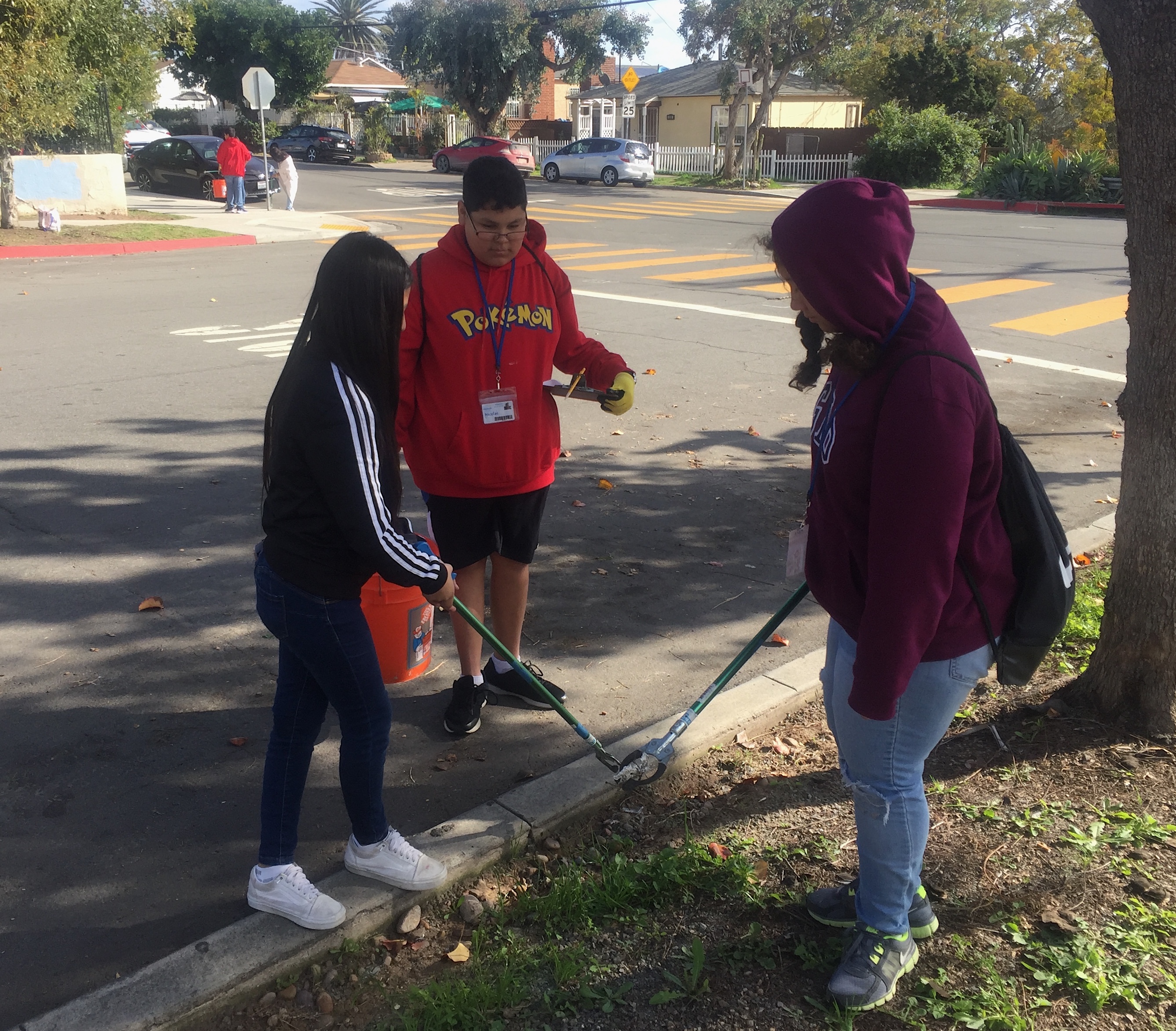This effort contributes to the reduction of land-based sources of trash through the development of standardized street trash monitoring protocols and Trash Troop, a complementary interactive education curriculum.

Trash Troop participants puting the protocols to practice
The protocols and educational curriculum are aimed at community science and school groups looking to contribute to our understanding of the sources of litter, and the curriculum teaches about the problems, effects, and solutions related to trash, including building a science identity to inform and empower young people to take action.
For more information about the project see: Taking it to the streets: Developing an urban neighborhood trash monitoring protocol and education program to reduce coastal trash
Table of Contents
-
Street Trash Monitoring Protocols
-
Trash Troop Curriculum
-
The Problem
-
The Effects
-
The Solutions
-
Building a Science Identity
-
Videos
-
Related Marine Debris Projects
If you are an educator intending to use the Street Trash Monitoring Protocols and Trash Troop curriculum, please contact Extension Specialist, Theresa Talley, to help inform how and where these materials are being used, to provide feedback, and just to get some of your questions answered!
Street Trash Monitoring Protocols
Collect data while you clean up the neighborhood! The standardized protocols (PDF), which consist of instructions and datasheets, can be used with your group to collect and monitor trash along the streets. The protocol offers a flexible, tiered approach to trash monitoring, allowing community scientists to choose the types and amounts of data they collect based on their interests, goals, abilities, and time.
Students sorting through the urban trash they collected
The protocol includes 1) a field-based assessment of trash and other neighborhood features that may contribute to trash levels, 2) a web-based assessment of contributing features, and 3) an in-depth quantitative assessment of the types and amounts of trash collected.
Datasheets for each assessment are downloadable:
- Web site assessment sheet (PDF): Use Google Earth to record data about the blocks you assess, including calculating geographic coordinates and the lengths of the various land-use types.
- Field site assessment sheet (PDF): Assess each block for features that may influence amounts and types of trash, including the slope of the street, ground cover, land uses, and numbers of parked cars and waste bins.
- Quantitative trash sheet (PDF): Record the types and amounts of trash collected with the level of detail increasing with each of four tiers of information.
Trash Troop Curriculum
The Problem
Students using Google Earth to explore rivers of the world
Plastic Production/Life Cycle – Understand where plastic comes from, how it is produced, and what happens once it is no longer used.
Watershed Flows (PDF) – Build a city, trash it up, and visualize how trash and contaminants move through a watershed after precipitation events.
Google Earth Rivers (PDF) – Learn to use Google Earth while seeing how trash flows through rivers, over hundreds and thousands of miles, before reaching oceans and ending up in gyres.
Trash Can Audit (PDF) – Assess the contents of your classroom, kitchen or other common area bin to see the types and amounts of waste we generate, and how much is misplaced preventing proper disposal of materials.
The Effects
Students wrapping up their beach transect
Green Space Bingo (PDF) – Learn about the small ways that humans impact green spaces and natural areas by crossing off items found while playing bingo.
Urban Scavenger Hunt (PDF) – Learn what humans commonly leave behind by trying to find all of the items on this scavenger hunt.
Local Waterway Trash Transect (PDF) – Whether a stream, river, or beach, conduct a survey to see how much trash is deposited on the shore as the tides and flow change; compare your findings with the trash found on streets.
The Solutions
Demonstration on making a type of bio-plastic using milk
Science through Art (PDF) – Upcycle plastic and other items that would simply be disposed of while creating art and learning about materials.
Casein Plastic (PDF) – Create bioplastic by using a method that derives casein, a protein, from milk.
Starch Plastic (PDF) – Create bioplastic by using starch from corn.
Plastic-Free Lunch (PDF) – Take a trip to the store to purchase plastic-free options for lunch.
The Final Straw (PDF) – Take a stand against plastic by making a pledge to change one aspect of daily life that uses a lot of plastic.
Science Identity
Student reflecting on future career aspirations
Career Quiz (PDF) – Explore possible future careers by taking this RIASEC quiz.
Who Are Scientists? (PDF) – Gauge the changes in young people's perceptions of scientists by having them work in groups to depict a “typical” scientist.
What Is Science? (PDF) – Discuss and illustrate the basics of the scientific process to establish a baseline of understanding through an experiment.
Sentence Stems (PDF) – Encourage reflection and assess learning and changes in perception by completing these sentence stems.
Videos
The Evolution of Plastic (Chesapeake Quarterly Arc GIS storymap)
Investigating Plastic Pollution - The Basics (Algalita/Youtube)
The Story of Plastic: The Plastic Bag Diet (The Story of Stuff Project/Youtube)
What Really Happens to the Plastic You Throw Away - Emma Bryce (TED-Ed/Youtube)
The Story of Plastic: Where Your Recycled Plastic Ends Up (The Story of Stuff Project/Youtube)
Inside the Lab That Could Solve the World's Plastics Problem (Bloomberg QuickTake/Youtube)
Filtering a Plastic Ocean (Audpop)
#CleanSeas Break-Up PSA: "It's not me, it's you." (UN Environment Programme/Youtube)
A Plastic Wave - A Documentary Film on Plastic Pollution (Youtube)
Related Marine Debris Projects
National Geographic - Ocean Plastics
